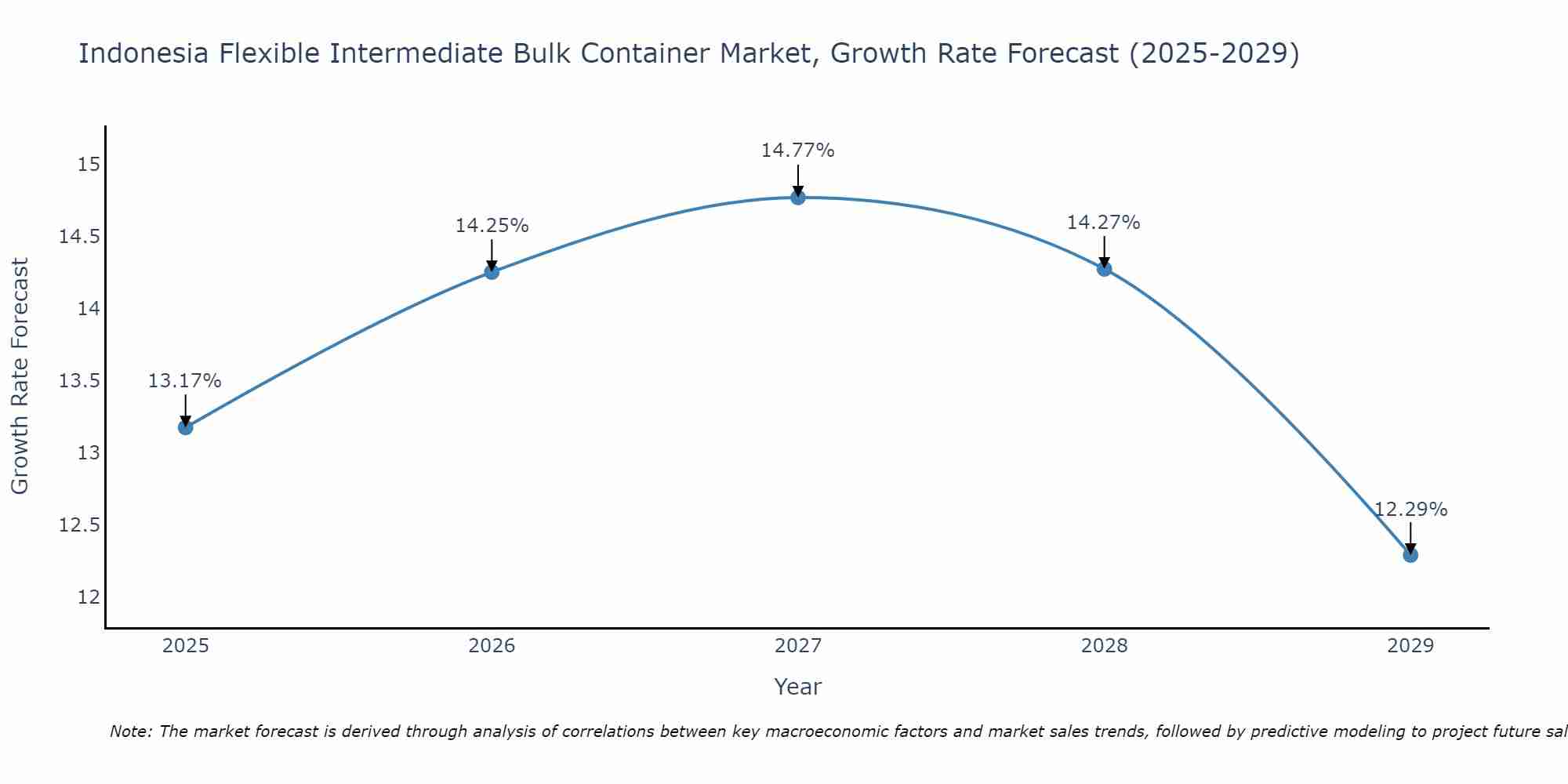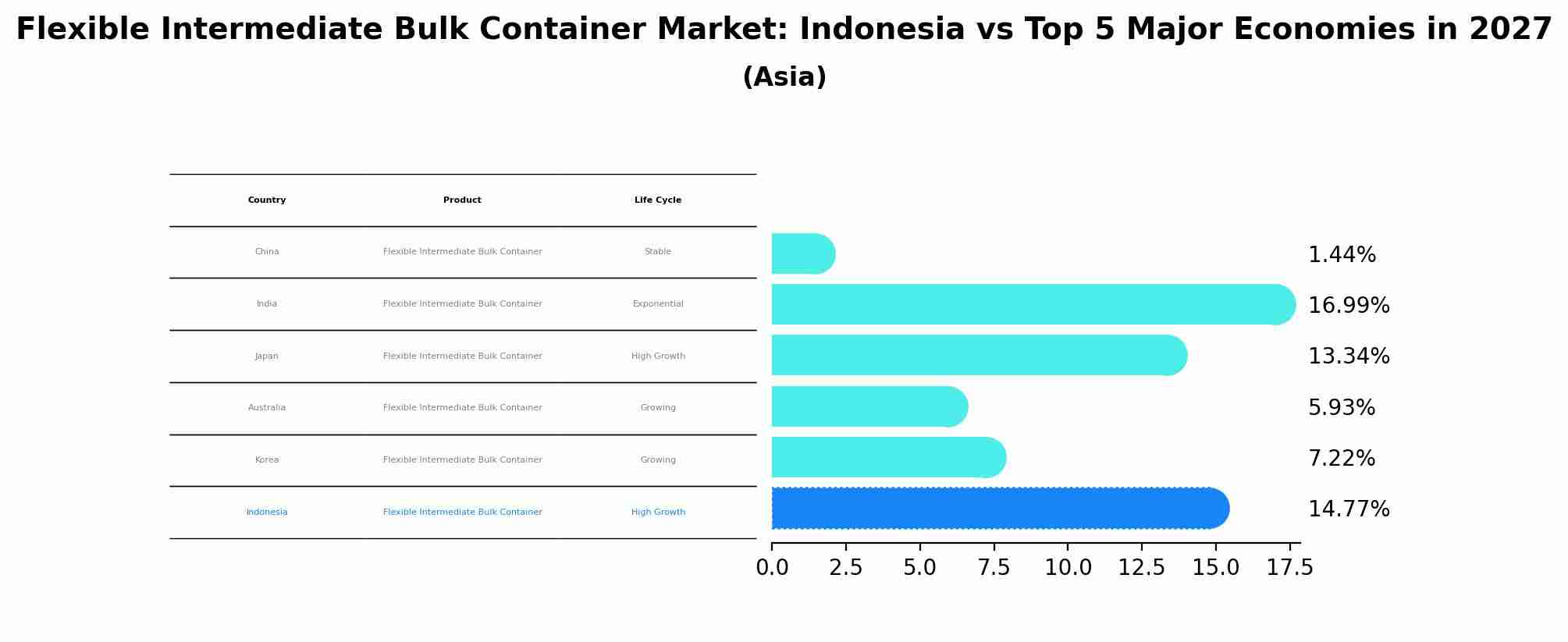Indonesia Flexible Intermediate Bulk Container Market (2025-2031) Outlook | Share, Forecast, Industry, Revenue, Growth, Trends, Size, Companies, Value & Analysis
| Product Code: ETC373888 | Publication Date: Aug 2022 | Updated Date: Apr 2025 | Product Type: Market Research Report | |
| Publisher: 6Wresearch | Author: Ravi Bhandari | No. of Pages: 75 | No. of Figures: 35 | No. of Tables: 20 |
Indonesia Flexible Intermediate Bulk Container Market Size Growth Rate
The Indonesia Flexible Intermediate Bulk Container Market is projected to witness mixed growth rate patterns during 2025 to 2029. Starting at 13.17% in 2025, the market peaks at 14.77% in 2027, and settles at 12.29% by 2029.

Flexible Intermediate Bulk Container Market: Indonesia vs Top 5 Major Economies in 2027 (Asia)
In the Asia region, the Flexible Intermediate Bulk Container market in Indonesia is projected to expand at a high growth rate of 14.77% by 2027. The largest economy is China, followed by India, Japan, Australia and South Korea.

Indonesia Flexible Intermediate Bulk Container Market Synopsis
The Indonesia Flexible Intermediate Bulk Container (FIBC) market is experiencing significant growth due to its versatility in packaging and transportation. FIBCs, often referred to as bulk bags or super sacks, are used across various industries for handling and transporting bulk materials such as chemicals, food products, and agricultural commodities. The ease of handling and cost-effectiveness of FIBCs make them a preferred choice for many businesses. As industries continue to expand and trade volumes increase, the demand for FIBCs is expected to rise, further fueled by the need for efficient and sustainable packaging solutions.
Drivers of the Market
The flexible intermediate bulk container (FIBC) market is buoyed by the country`s manufacturing and export industries. FIBCs are essential for bulk transportation of goods, such as agricultural products, chemicals, and construction materials. Indonesia`s strategic location as a trade hub in Southeast Asia enhances the demand for FIBCs, especially in the context of international trade.
Challenges of the Market
The indonesia Flexible Intermediate Bulk Container (FIBC) market faces several challenges. One significant obstacle is the increasing competition from other packaging solutions, such as traditional sacks and containers, which offer lower costs. Additionally, the fluctuation in raw material prices, especially polypropylene, impacts the manufacturing cost of FIBCs. Moreover, compliance with international quality standards and regulations is a challenge, as it requires continuous investment in technology and quality control. Lastly, logistics and transportation constraints in the archipelago nation pose difficulties in delivering FIBCs to remote areas efficiently.
COVID-19 Impact on the Market
The Flexible Intermediate Bulk Container (FIBC) market in Indonesia was impacted by supply chain disruptions and a decline in international trade. As many industries faced reduced production and logistics challenges, the demand for FIBCs decreased. However, the market adapted by diversifying its product offerings, exploring new applications, and focusing on domestic demand. The recovery of international trade and industries like agriculture and chemicals is expected to drive growth in the FIBC market.
Key Players in the Market
The flexible intermediate bulk container (FIBC) market in Indonesia is witnessing expansion due to the country`s growing industrial sector. Major players like Berry Global Group, Conitex Sonoco, and Global-Pak dominate this market, offering various FIBC solutions to cater to the diverse needs of industries such as agriculture, chemicals, and construction.
Key Highlights of the Report:
- Indonesia Flexible Intermediate Bulk Container Market Outlook
- Market Size of Indonesia Flexible Intermediate Bulk Container Market, 2024
- Forecast of Indonesia Flexible Intermediate Bulk Container Market, 2031
- Historical Data and Forecast of Indonesia Flexible Intermediate Bulk Container Revenues & Volume for the Period 2021-2031
- Indonesia Flexible Intermediate Bulk Container Market Trend Evolution
- Indonesia Flexible Intermediate Bulk Container Market Drivers and Challenges
- Indonesia Flexible Intermediate Bulk Container Price Trends
- Indonesia Flexible Intermediate Bulk Container Porter's Five Forces
- Indonesia Flexible Intermediate Bulk Container Industry Life Cycle
- Historical Data and Forecast of Indonesia Flexible Intermediate Bulk Container Market Revenues & Volume By Product for the Period 2021-2031
- Historical Data and Forecast of Indonesia Flexible Intermediate Bulk Container Market Revenues & Volume By Type A for the Period 2021-2031
- Historical Data and Forecast of Indonesia Flexible Intermediate Bulk Container Market Revenues & Volume By Type B for the Period 2021-2031
- Historical Data and Forecast of Indonesia Flexible Intermediate Bulk Container Market Revenues & Volume By Type C for the Period 2021-2031
- Historical Data and Forecast of Indonesia Flexible Intermediate Bulk Container Market Revenues & Volume By Type D for the Period 2021-2031
- Historical Data and Forecast of Indonesia Flexible Intermediate Bulk Container Market Revenues & Volume By End-Use for the Period 2021-2031
- Historical Data and Forecast of Indonesia Flexible Intermediate Bulk Container Market Revenues & Volume By Food for the Period 2021-2031
- Historical Data and Forecast of Indonesia Flexible Intermediate Bulk Container Market Revenues & Volume By Chemical for the Period 2021-2031
- Historical Data and Forecast of Indonesia Flexible Intermediate Bulk Container Market Revenues & Volume By Pharmaceuticals for the Period 2021-2031
- Historical Data and Forecast of Indonesia Flexible Intermediate Bulk Container Market Revenues & Volume By Others for the Period 2021-2031
- Indonesia Flexible Intermediate Bulk Container Import Export Trade Statistics
- Market Opportunity Assessment By Product
- Market Opportunity Assessment By End-Use
- Indonesia Flexible Intermediate Bulk Container Top Companies Market Share
- Indonesia Flexible Intermediate Bulk Container Competitive Benchmarking By Technical and Operational Parameters
- Indonesia Flexible Intermediate Bulk Container Company Profiles
- Indonesia Flexible Intermediate Bulk Container Key Strategic Recommendations
Frequently Asked Questions About the Market Study (FAQs):
Export potential assessment - trade Analytics for 2030
Export potential enables firms to identify high-growth global markets with greater confidence by combining advanced trade intelligence with a structured quantitative methodology. The framework analyzes emerging demand trends and country-level import patterns while integrating macroeconomic and trade datasets such as GDP and population forecasts, bilateral import–export flows, tariff structures, elasticity differentials between developed and developing economies, geographic distance, and import demand projections. Using weighted trade values from 2020–2024 as the base period to project country-to-country export potential for 2030, these inputs are operationalized through calculated drivers such as gravity model parameters, tariff impact factors, and projected GDP per-capita growth. Through an analysis of hidden potentials, demand hotspots, and market conditions that are most favorable to success, this method enables firms to focus on target countries, maximize returns, and global expansion with data, backed by accuracy.
By factoring in the projected importer demand gap that is currently unmet and could be potential opportunity, it identifies the potential for the Exporter (Country) among 190 countries, against the general trade analysis, which identifies the biggest importer or exporter.
To discover high-growth global markets and optimize your business strategy:
Click Here- Single User License$ 1,995
- Department License$ 2,400
- Site License$ 3,120
- Global License$ 3,795
Search
Thought Leadership and Analyst Meet
Our Clients
Related Reports
- India Switchgear Market Outlook (2026 - 2032) | Size, Share, Trends, Growth, Revenue, Forecast, Analysis, Value, Outlook
- Pakistan Contraceptive Implants Market (2025-2031) | Demand, Growth, Size, Share, Industry, Pricing Analysis, Competitive, Strategic Insights, Strategy, Consumer Insights, Analysis, Investment Trends, Opportunities, Revenue, Segments, Value, Segmentation, Supply, Forecast, Restraints, Outlook, Competition, Drivers, Trends, Companies, Challenges
- Sri Lanka Packaging Market (2026-2032) | Outlook, Competition, Drivers, Trends, Demand, Pricing Analysis, Competitive, Strategic Insights, Companies, Challenges, Strategy, Consumer Insights, Analysis, Investment Trends, Opportunities, Growth, Size, Share, Industry, Revenue, Segments, Value, Segmentation, Supply, Forecast, Restraints
- India Kids Watches Market (2026-2032) | Strategy, Consumer Insights, Analysis, Investment Trends, Opportunities, Growth, Size, Share, Industry, Revenue, Segments, Value, Segmentation, Supply, Forecast, Restraints, Outlook, Competition, Drivers, Trends, Demand, Pricing Analysis, Competitive, Strategic Insights, Companies, Challenges
- Saudi Arabia Core Assurance Service Market (2025-2031) | Strategy, Consumer Insights, Analysis, Investment Trends, Opportunities, Growth, Size, Share, Industry, Revenue, Segments, Value, Segmentation, Supply, Forecast, Restraints, Outlook, Competition, Drivers, Trends, Demand, Pricing Analysis, Competitive, Strategic Insights, Companies, Challenges
- Romania Uninterruptible Power Supply (UPS) Market (2026-2032) | Industry, Analysis, Revenue, Size, Forecast, Outlook, Value, Trends, Share, Growth & Companies
- Saudi Arabia Car Window Tinting Film, Paint Protection Film (PPF), and Ceramic Coating Market (2025-2031) | Strategy, Consumer Insights, Analysis, Investment Trends, Opportunities, Growth, Size, Share, Industry, Revenue, Segments, Value, Segmentation, Supply, Forecast, Restraints, Outlook, Competition, Drivers, Trends, Demand, Pricing Analysis, Competitive, Strategic Insights, Companies, Challenges
- South Africa Stationery Market (2025-2031) | Share, Size, Industry, Value, Growth, Revenue, Analysis, Trends, Segmentation & Outlook
- Afghanistan Rocking Chairs And Adirondack Chairs Market (2026-2032) | Size & Revenue, Competitive Landscape, Share, Segmentation, Industry, Value, Outlook, Analysis, Trends, Growth, Forecast, Companies
- Afghanistan Apparel Market (2026-2032) | Growth, Outlook, Industry, Segmentation, Forecast, Size, Companies, Trends, Value, Share, Analysis & Revenue
Industry Events and Analyst Meet
Whitepaper
- Middle East & Africa Commercial Security Market Click here to view more.
- Middle East & Africa Fire Safety Systems & Equipment Market Click here to view more.
- GCC Drone Market Click here to view more.
- Middle East Lighting Fixture Market Click here to view more.
- GCC Physical & Perimeter Security Market Click here to view more.
6WResearch In News
- Doha a strategic location for EV manufacturing hub: IPA Qatar
- Demand for luxury TVs surging in the GCC, says Samsung
- Empowering Growth: The Thriving Journey of Bangladesh’s Cable Industry
- Demand for luxury TVs surging in the GCC, says Samsung
- Video call with a traditional healer? Once unthinkable, it’s now common in South Africa
- Intelligent Buildings To Smooth GCC’s Path To Net Zero


















